Now we have the si
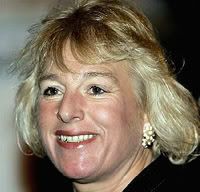 tuation whereby a presenter on its evening magazine programme, the one show has been fired for allegedly having made a "racist" comment on Thursday, 29 January about an unidentified tennis-player off-air, in a private conversation in the green room. She is said to have compared the hair of a tennis player to the hair of the golliwog that used to be depicted on the Robertson's jam pots, and suddenly the ideologically beautiful press is screaming that she called a black man a golliwog.
tuation whereby a presenter on its evening magazine programme, the one show has been fired for allegedly having made a "racist" comment on Thursday, 29 January about an unidentified tennis-player off-air, in a private conversation in the green room. She is said to have compared the hair of a tennis player to the hair of the golliwog that used to be depicted on the Robertson's jam pots, and suddenly the ideologically beautiful press is screaming that she called a black man a golliwog.The BBC said it would decide on whether Carol Thatcher could continue on the programme after an apology from her, which she promptly gave, and the decision was that she had to go.
Ferris State University's Jim Crow Museum of Racist Memorabilia gives a comp
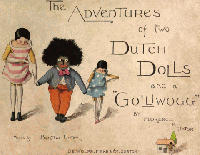 rehensive account of golliwog iconography, starting with its origins as a rag doll in the southern states of the US in the form of a minstrel - a white man blacked up - and going through its first gallant appearance in Bertha and Florence Kate Upton's 1895 The Adventures of two Dutch Dolls and a "Golliwog" to its less gallant appearance in Enid Blyton's series of Noddy stories, and in between its aforementioned appearance on jars of Robertson's jam.
rehensive account of golliwog iconography, starting with its origins as a rag doll in the southern states of the US in the form of a minstrel - a white man blacked up - and going through its first gallant appearance in Bertha and Florence Kate Upton's 1895 The Adventures of two Dutch Dolls and a "Golliwog" to its less gallant appearance in Enid Blyton's series of Noddy stories, and in between its aforementioned appearance on jars of Robertson's jam.Right away, though, we run into difficulties. The minstrels were represented on British TV in the BBC's own The Black and White Minstrel Show, the hugely popular variety show which finished after a campaign by ideological guerrillas in 1975. The most famous face
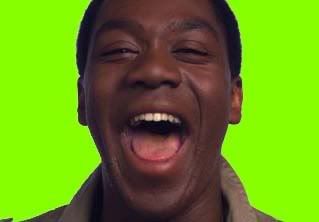 to be launched by this show is Lenny Henry, probably Britain's best-loved black comedian and actor; had the show not been pulled, more black people may have similarly seen their careers launched.
to be launched by this show is Lenny Henry, probably Britain's best-loved black comedian and actor; had the show not been pulled, more black people may have similarly seen their careers launched.I detest abuse on the grounds of the genetic accident of skin colour, but it's not even certain that Thatcher's "golliwog" epithet, made in the context of last week's Australian Open tennis championship, referred to the barnet of a black fellow: the top two contenders for golliwog-hair are Scottish Andy Murray and Frenchman Gaël Monfils. Both crops are shown below with that of our fictional friend.

The thing is, as (surprisingly) The Guardian's Michael White blogs, militant anti-racism can be as selective as the discrimination it deplores. When a thin white girl with long blonde hair is compared to Barbie, it isn't usually a complement - as used, for example, about Claudia Schiffer, by the li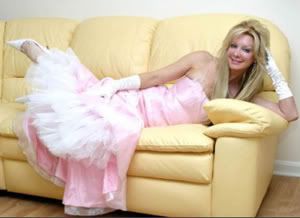 beral-socialist media machine. Multiple enhancee Sarah Burge, however, has turned the discrimination on its head by presenting herself as the "Real-life Barbie".
beral-socialist media machine. Multiple enhancee Sarah Burge, however, has turned the discrimination on its head by presenting herself as the "Real-life Barbie".
I think Lenny Henry was doing the same thing when he agreed to provide the voice, in Harry Potter and the Prisoner of Azkaban (my favourite Potter movie), of Shrunken Head, who is animated as a rasta-haired trophy on a string similar to what might have been produced by headhunters as imagined in, say, King Kong. This is in its own way as much of a race-based distortion as the gollywog, as of all the world's headhunters, the only ones to produce shrunken heads were the Jivaro of what is now Ecuador and Peru, who would not have encountered black people speaking English with a Caribbean accent. This isn't to try to take the fun out of Harry Potter, merely to amplify White's point about the selectivity of anti-racism.
That a Guardian journalist should agree on one point with an ennobled Conservative sho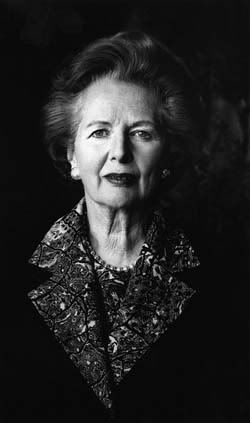 ws the depth of public dissatisfaction with the BBC's double standards. Both point to what has largely remained the elephant in the room - Carol Thatcher's parentage. As Norman (now Lord) Tebbit told the Telegraph, "It is probably a bit of a way for the BBC to get back at Carol's mother". Carol Thatcher is daughter of Baroness Margaret Thatcher, who was Great Britain's greatest peacetime Prime Minister, and fought running battles with the BBC over their coverage of, for instance, the Falklands War, the Miner's strike and the fight, which still continues, against hard-left influences in some unions which see political influence at the highest level as more important than the pay and conditions of their members.
ws the depth of public dissatisfaction with the BBC's double standards. Both point to what has largely remained the elephant in the room - Carol Thatcher's parentage. As Norman (now Lord) Tebbit told the Telegraph, "It is probably a bit of a way for the BBC to get back at Carol's mother". Carol Thatcher is daughter of Baroness Margaret Thatcher, who was Great Britain's greatest peacetime Prime Minister, and fought running battles with the BBC over their coverage of, for instance, the Falklands War, the Miner's strike and the fight, which still continues, against hard-left influences in some unions which see political influence at the highest level as more important than the pay and conditions of their members.
Meanwhile, Michael White ends his article on a chilling note:
The idea that [racism] is a vice unique to white Europeans or north Americans is also a bit of a chuckle, as the Chinese will one day demonstrate when their looming hegemony provides some scope.Get ready for the BBC to ban the Fu Manchu films. But I won't be watching the BBC by then, so I'd better start dusting off my Mum's old videos of The Black and White Minstrel Show.












>That a Guardian journalist should agree on one point with an ennobled Conservative shows the depth of public dissatisfaction
ReplyDeleteNo it doesn't, it shows that the Guardian actually presents a range of viewpoints unlike most of the conservative-dominated media machine.
The fact is, however you want to spin it, 'golliwog' was for many years an insult used to mock black people, especially at school. Calling a black person a golliwog is racist and rude, simple as that. Saying 'she didn't call HIM a golliwog, she called his HAIR a golliwog!' is really not going to wash either, sorry. Defending Thatcher is a fool's errand.
That said, the Golliwog itself is an innocent thing. It did not start, as you claim, in the southern US; the Golly is entirely Upton's invention, but was based on a minstrel toy she had as a child, making it "a caricature of a caricature." It is a racist caricature seen through the eyes of a child, with all the racism effaced by the innocence of the viewer.
Thanks for your comment, Quidam, but if you read the Telegraph like me, you would have an idea of what is going through several Government figures' heads, because it regularly publishes articles written by them.
ReplyDeleteCarol Thatcher compared the hair of a player to the hair of a golliwog, it's not the same as saying the person is a golliwog.
I don't agree that defending Baroness Thatcher is a fool's errand. As Iain Dale said in an interview with George Galloway (in which Galloway turned off Dale's mike several times...Conservative-dominated media machine?), it's because if you are in a position of executive authority then some of the things you decide will be wrong. Gordon Brown's particularly good at it.